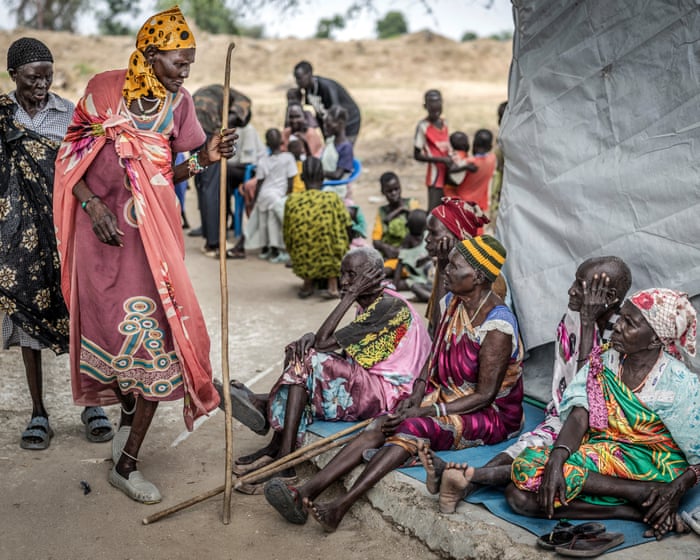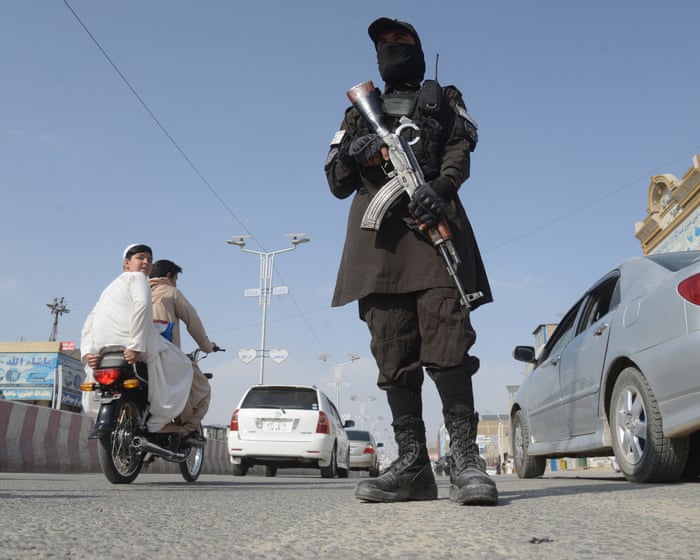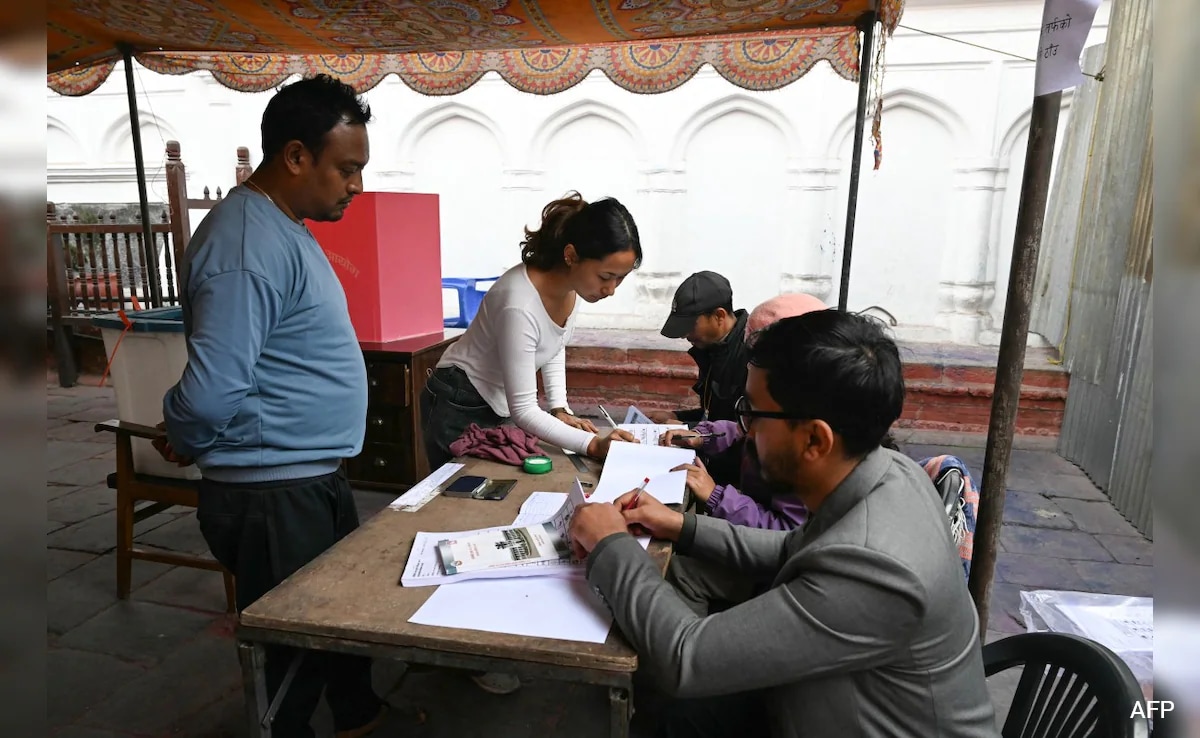Top World News

Mar 3, 2026

South Sudan risks return to full-blown civil war as violence escalates
At least 169 killed in raid near Sudan border as clashes between government and opposition forces intensifySouth Sudan is reeling from an escalating conflict between the government-aligned army and opposition forces and allied groups that observers say risks returning the country to a full-blown civil war.Violent confrontations in the world’s youngest country between the military, which is loyal to President Salva Kiir, and insurgents believed to be allied to the suspended vice-president, Riek Machar, have increased in recent weeks. Continue reading...

Mar 3, 2026

Macron orders France's nuclear-powered aircraft carrier to the Mediterranean
French President Emmanuel Macron has France’s nuclear-powered aircraft carrier to move from the Baltic Sea to the Mediterranean to protect allied assets during the ongoing war in the Middle East

Mar 3, 2026

Iran peace talks a 'smokescreen' as decision to strike had already been made: analysis
Peace talks between the United States and Iran may have been a smokescreen as a decision to strike had already been made, an analyst has claimed. Bill Press, the former California Democratic Party chair, believes Donald Trump's administration already knew a strike on Iran would be made while also hosting peace talks with representatives. In a column for The Hill, Press claimed a decision could have been made as early as before Trump delivered his State of the Union address. Press wrote, "Iran didn’t walk away from making a new deal. The U.S. did — and it started bombing the next morning. In fact, there is reason to believe that the entire Geneva operation was only a smokescreen, designed to fool Iran’s leaders into thinking the U.S. was negotiating in good faith. "Clearly, the decision to bomb Iran had already been made before the State of the Union, while the Trump administration was still pretending to be seriously interested in diplomacy." Press went on to suggest that the deal the US and Iran had discussed before the bombing was nearing a reasonable conclusion. "Israeli Prime Minister Benjamin Netanyahu and Saudi Crown Prince Mohammed bin Salman urged Trump to take advantage of the opportunity to kill Khamenei," he wrote. "Trump agreed to do their dirty work."It is also not true, as Trump claims, that Iran 'walked away from the table' without agreeing to abandon plans to build a nuclear bomb. In fact, as late as last Friday, negotiations between Iran and the U.S., moderated by Oman, were still underway in Geneva — with public assurances of progress being made."Trump issued a statement on the Iran war earlier today (March 3), with the president claiming a war with the Middle Eastern country could last much longer than anticipated. He wrote, "The United States Munitions Stockpiles have, at the medium and upper medium grade, never been higher or better - As was stated to me today, we have a virtually unlimited supply of these weapons. Wars can be fought 'forever,' and very successfully, using just these supplies (which are better than other countries finest arms!)."At the highest end, we have a good supply, but are not where we want to be. Much additional high-grade weaponry is stored for us in outlying countries."Sleepy Joe Biden spent all of his time, and our Country’s money, GIVING everything to P.T. Barnum (Zelenskyy!) of Ukraine - Hundreds of Billions of Dollars worth - And, while he gave so much of the super high-end away (FREE!), he didn’t bother to replace it. Fortunately, I rebuilt the military in my first term, and continue to do so."The United States is stocked, and ready to WIN, BIG!!! Thank you for your attention to this matter. President DONALD J. TRUMP."

Mar 3, 2026

'I was stunned': Ex-CIA senior official left 'speechless' by Marco Rubio's 'stupid' move
A former senior intelligence service official said on Tuesday that Marco Rubio's latest comments about the Iran war left him and other observers "speechless."Rubio raised eyebrows with his comment on the Iran war, which largely pointed to Israel as the chief reason for the US involvement.CNN's Alayna Treene reported this:"Rubio speaking to reporters now says the 'imminent threat' the administration has referred to to justify US strikes on Iran was that they knew Israel was going to attack Tehran, and believed such an attack would prompt Iran to strike US bases and assets in the region."Pod Save The World's Ben Rhodes shared Treene's reporting and replied, "America doesn't have to go to war just because Israel was going to go to war."National security expert Danny (Dennis) Citrinowicz also chimed in, adding, "If there is a strategic risk greater than Iran itself for Israel, it is the perception that Israel pushed the United States into a discretionary and open-ended war. In the current American political environment, perception matters as much as operational reality.""Israel’s standing among younger Americans, within significant parts of the Democratic Party, and even among segments of the Republican coalition, is already under strain," he added in response to comments by Rubio.That led to ex-CIA senior official Marc Polymeropoulos to speak out. He said, "Rubio in his statement and the admin’s decision to toss this war all on Israel may have catastrophic effects on future American support for Israel."The expert further added:"I texted an Israeli friend right after Rubio’s presser and said just that-it’s a step away from essentially blaming Israel (which he did) to saying ‘blame the Jews.’ I was stunned at the abject stupidity of this tact from the admin and it left me speechless. All the anti semitic crazies feel validated now."Rubio in his statement and the admin’s decision to toss this war all on Israel may hav catastrophic effects on future American support for Israel. Below analysis is spot on. I texted an Israeli friend right after Rubio’s presser and said just that-it’s a step away from… https://t.co/ul7WsAzYp4— Marc Polymeropoulos (@Mpolymer) March 3, 2026

Mar 3, 2026

‘Imperialist undertones’: global south condemns US-Israeli war with Iran
China calls it unacceptable to ‘kill leader of sovereign state’, while South Africa questions ‘pre-emptive’ justificationMiddle East crisis – live updatesThe US-Israeli war on Iran has been condemned as illegal across much of the global south, with China saying it was unacceptable to “blatantly kill the leader of a sovereign state”.Many countries objected that negotiations between the US and Iran over its nuclear programme and missile capability were not given a chance to succeed before Washington and Israel began bombing, and analysts often saw the war in terms of a colonial-style exercise of might. Continue reading...

Mar 3, 2026

Trump just committed a naked crime — and the horrific reason is all too clear
Operation Epstein Fury — with a bonus to help Bibi get re-elected so he doesn’t have to face charges for his criminal behavior — is rolling on as Donald Trump ignores the constitutional requirement that only Congress can declare war.He’s also violating the War Powers Resolution of 1973 that dictates the president, if he reacts to an actual attack on America like Pearl Harbor, must notify Congress within 48 hours and have authorization within 60 days. In this case there was no actual or even imminent attack against America.To further confuse things, Trump is throwing the Iranian protesters under the bus by saying that he’s willing to talk with the Iranian regime now that Ayatollah Khamenei is dead, much like he crapped on pro-democracy voters and protestors in Venezuela when he kept that repressive regime intact after illegally removing Nicolás Maduro and promising democracy.This conflict is also now spreading. Khamenei was to many Shia Muslims around the world something akin to what the Pope is to Catholics (there’s no equivalent among the Sunni Muslims). Imagine the Catholic world’s fury if a country had assassinated Pope Leo XIV: we’re now seeing Shia protests and outrage from Bangladesh to Pakistan to Lebanon.And here at home, Trump is musing about using Iranian interference in our 2020 election as an excuse to issue an emergency executive order to seize control of the upcoming November midterm election.Which is particularly ironic, given that the well-documented Iranian intervention that year was designed to help get Trump reelected (after all, he’d just torn up the JCPOA nuclear deal) and avoid a Biden administration from coming into power.Four Americans are dead and five in critical condition because of Iranian retaliatory strikes, as are civilians in several other US-aligned countries in the region. Along with around 200 young people in Iran after we bombed a girl’s school and a gymnasium.And it’s early days. As Winston Churchill famously said in 1936 about war:“Once the signal is given, no one can predict how far events will go.”America’s Founders and the Framers of our Constitution not only would have agreed with Churchill, but saw a president seizing war powers from Congress as an existential threat to the republic. On April 20, 1795, James Madison, who had just helped shepherd through the Constitution and Bill of Rights, and would become President of the United States in the following decade, wrote:“Of all the enemies to public liberty war is, perhaps, the most to be dreaded because it comprises and develops the germ of every other.”Reflecting on the ability of a president to use war as an excuse to become a virtual dictator, Madison continued his letter:“In war, too, the discretionary power of the Executive [President] is extended. Its influence in dealing out offices, honors, and emoluments is multiplied; and all the means of seducing the minds, are added to those of subduing the force of the people. The same malignant aspect in republicanism may be traced in the inequality of fortunes, and the opportunities of fraud, growing out of a state of war...and in the degeneracy of manners and morals, engendered by both.“No nation,” our fourth President and the Father of the Constitution concluded, “could preserve its freedom in the midst of continual warfare.”Since Madison’s warning, “continual warfare” has been used both in fiction and in the real world. In the novel Nineteen Eighty-Four by George Orwell, the way a seemingly democratic president kept his nation in a continual state of repression was by having a continuous war.The lesson wasn’t lost on Lyndon Johnson or Richard Nixon, who both extended the Vietnam war so it coincidentally ran over election cycles, knowing that a wartime president’s party is more likely to be reelected and has more power than a president in peacetime.And, as George W. Bush told his biographer in 1999:“One of the keys to being seen as a great leader is to be seen as commander in chief. My father had all this political capital built up when he drove the Iraqis out of Kuwait and he wasted it. If I have a chance to invade, if I had that much capital, I’m not going to waste it. I’m going to get everything passed that I want to get passed and I’m going to have a successful presidency.”Every Republican president since Reagan has had his own “little war.” Now it’s Trump’s turn, after all the times over the years he warned that if Barak Obama was ever in trouble he’d start a war with Iran to distract us:“In order to get elected, @BarackObama will start a war with Iran.” (2011)“Our president will start a war with Iran because he has absolutely no ability to negotiate. He’s weak and he’s ineffective…” (2011)“@BarackObama will attack Iran in the not too distant future because it will help him win the election.” (2012)“Now that Obama’s poll numbers are in tailspin — watch for him to launch a strike in Libya or Iran. He is desperate.” (2012)“Remember what I said about @BarackObama attacking Iran before the election…” (2012)“I predict that President Obama will at some point attack Iran in order to save face!” (2013)Given that Baron, Don Jr, and Eric Trump all apparently suffer from hereditary bone spurs and no Trump has ever served as a “loser” or “sucker” in our military (and his grandfather came to America as a German draft-dodger), it’s unlikely this war will mean anything other than profit-making opportunities for the Trump children.But it compounds his constant ignoring of constitutional limits on presidential power ranging from gutting federal agencies without authorization to having ICE routinely ignore court orders, flagrantly violate the Fourth Amendment, and daily lie to the American people.Nobody invested in peace or democracy is mourning the death of the Iranian dictator or the possible unraveling of its theocracy. But must we do it in a way that breaks both US and international law?Trump apparently thinks so; not only will it distract from the news reports that he allegedly raped at least one and maybe more 13-year-olds — allegations he denies — and his naked corruption and bribe-taking but it also carves another “screwed Congress” notch in his belt.There was no attack on America, as required by the War Powers Resolution. There wasn’t even a serious possibility of an attack on America.Madison and the Founders of his generation had it right: this is a naked crime by Trump and Hegseth against our Constitution and our laws and requires a strong congressional response such as impeachment.Thom Hartmann is a New York Times best-selling author and SiriusXM talk show host. His Substack can be found here.

Mar 2, 2026

Here are Trump's endgame options in his attack on Iran
Now that President Donald Trump has launched an illegal, unprovoked war of choice on Iran, the next question inevitably becomes: how does this end? Or, what are some off-ramps Trump can take to end it before the situation turns out of control?There are three broad scenarios; the first and most likely is that Trump continues this until he gets some sort of regime implosion and then declares victory, while also washing his hands of whatever follows.This has been very clear in internal conversations: no one wants to take responsibility for the aftermath. This is essentially the difference between regime change and regime collapse.That’s why they didn’t want to do an Iraq War-style regime change where you are actively trying to install a new government. If you do that, its track record becomes your track record.Indeed, if the US manages to kill a lot of the different leaders of the current system, there could be some sort of an implosion. Trump could declare victory even though you would likely have in that case severe instability, or potentially civil war.Another scenario is that the Iranians continue to strike back and outlast Trump. The Iranian onslaught would start to become too costly for the United States with casualty rates increasing (possibly even on the American side), inflation worsens, and global markets become destabilized.And then the pressure on Trump internationally, from the American public, and from his own base would start to become so strong that he would have to look for an exit.At that point, he may actually take the deal that was on the table: a deal that is better than what Barack Obama managed to secure, and that Trump nevertheless rejected. He may take that and suddenly declare it a victory, saying: “Thanks to my bombing campaign, we achieved this.”There is also a third scenario, that is the least likely, in which after a couple of rounds of attacks, both sides may feel they can go back to the negotiating table.They might even go back to the same agreement that was on the table during the most recent talks. And both sides could frame that as a win. Trump can claim he bombed Iran and was very successful. The Iranians can claim they struck back and were very successful. And then they come to some sort of agreement.However that would be difficult because there’s now absolutely no trust between the US and Iran.But even if they did come to some form of agreement, it would be extremely difficult to implement, it would likely not endure, and it wouldn’t be anything more than essentially a ceasefire with a pretense of having a deal beyond that.Meanwhile, Israel’s interest is in pushing the narrative that the negotiations were a ruse from the outset, and that this attack was already planned — because that narrative destroys America’s credibility as a diplomatic force, as a negotiator.And the more you push the narrative that diplomacy was a lie from the outset, the more easily you can avoid any future negotiations.I’m not convinced it really was a ruse from the beginning. There were elements in the US government who were sincere about the diplomatic path, but ultimately Trump fell for the type of pressure that he has proven himself to be far too susceptible to.None of that makes what happened forgivable. It doesn’t make it legal. It doesn’t make it strategic. But we do have to recognize this: nothing would serve Israeli interests more than to completely destroy America’s credibility as a negotiating partner.Trita Parsi is Executive Vice President of the Quincy Institute and an expert on US-Iranian relations, Iranian foreign politics, and the geopolitics of the Middle East. He is author of "Losing an Enemy — Obama, Iran and the Triumph of Diplomacy"; "A Single Roll of the Dice — Obama's Diplomacy with Iran"; and "Treacherous Alliance: The Secret Dealings of Israel, Iran, and the United States." This article was adapted from Trita Parsi’s remarks during an appearance on Breaking Points

Mar 2, 2026

National security expert slaps down Rubio's 'implausible rationale' on Iran bombing
A historian and national security specialist was skeptical Monday of Secretary of State Marco Rubio's first public comments defending the Trump administration's decision to launch strikes against Iran. CNN national security analyst Peter Bergen expressed doubt about Rubio's argument of an "imminent threat" and what could happen next in the war with Iran, which has left six American service members dead. "Casey, I'm extremely skeptical," Bergen told CNN anchor Kasie Hunt. "I mean, the Israelis and the United States are very closely allied. And their operations, as we've seen just now, are very closely integrated," Bergen added. "And Netanyahu has been in D.C., repeatedly. We've been moving massive amounts of military assets into the region since January, so I just find that kind of an implausible rationale."

Mar 2, 2026

Dem ignites firestorm within his own party over Iran remarks: 'You sure did fool us'
Sen. John Fetterman (D-PA) said he was "baffled" Monday that his Senate colleagues weren't supporting President Donald Trump's decision to begin military strikes in Iran — and Democrats were furious at his comments. The Pennsylvania Democrat's loyalty has increasingly been called into question as he has shown he was breaking with Democrats over the war in Iran, Politico reported."Every member in the U.S. Senate agrees we cannot allow Iran to acquire a nuclear weapon. I’m baffled why so many are unwilling to support the only action to achieve that. Empty sloganeering vs. commitment to global security — which is it?" Fetterman wrote on X. Other Democrats and commentators had strong responses to Fetterman's statement. “Well, John Fetterman knows better,” House Minority Leader Hakeem Jeffries told CNN. “Article I of the Constitution explicitly provides Congress with the authority to declare war. Period, full stop.”"A man who has never seen war and never will, cheering this on from a comfortable perch in Washington. Every Senator who fails to stop this war should lose their seat, starting with @SenSusanCollins and @SenFettermanPA," Democratic Senate candidate and veteran Graham Platner wrote on X."Any politician who votes to start another endless war in the Middle East should lose their seat in 2026," California state congressional candidate and co-founder of Justice Democrats Saikat Chakrabarti wrote on X."'The only action?' Bombing a school and slaughtering young children is 'the only action?' The President committing acts of war without Congressional approval and lying to the American people is 'the only action?' Deploying our loved ones into another forever war is 'the only action?' Resign," Charles Booker, Kentucky Senate candidate and former Kentucky state representative, wrote on X."You sure did fool us all," media and communications specialist Louw Breytenbach wrote on X."The only action? 1) Iran was not working on a nuclear weapon, as confirmed by US intelligence. 2) There was a nuclear agreement with Iran that was keeping its enrichment levels low. Trump left that agreement, and then Iran responded by increasing enrichment. Every sabotage and attack since has caused Iran to increase enrichment further. 3) Military strikes to stop the program worked so well that after 'obliterating' their nuclear program eight months ago, we are already concerned about it again. You are a warmonger. It is that simple," Navy veteran and independent writer Jared Ryan Sears wrote on X.

Mar 2, 2026

Afghanistan says it thwarted Pakistan airstrikes on Bagram airbase
Sporadic clashes reported in several provinces in Afghanistan as both sides give conflicting death tollsAfghanistan has said it had thwarted Pakistan’s attempted airstrikes on Bagram airbase, the former US military base north of Kabul, as cross-border fighting between the two countries stretched into a fourth day.Months of clashes have flared up again since Thursday, when Afghanistan launched attacks along the frontier and Pakistani forces hit back on the border and from the skies. Pakistan has declared it is in “open war” with Afghanistan. Continue reading...

Feb 28, 2026

‘Adventurism has had its day’: speedboat shootout leaves Miami’s exiled Cubans bewildered
Few clues as to how 10 heavily armed men intercepted on stolen speedboat came together from across Florida or what they hoped to achieve Foot traffic was slow outside the Bay of Pigs Museum on Calle Ocho in Miami’s Little Havana neighbourhood. A few tourists in T-shirts and shorts bypassed the gallery dedicated to one of the most fateful days in Cuba’s history and headed instead to nearby Máximo Gómez Park to take photographs of Cuban exiles playing dominoes.This is the street at the heart of the Cuban expat community of more than 1 million people where tens of thousands partied through the night in November 2016 to celebrate the death of Fidel Castro, and where they gathered in sorrow almost exactly 30 years ago to mourn four Cuban-Americans shot down by the communist country’s air force as they conducted a mission for the humanitarian exile group Brothers to the Rescue. Continue reading...

Feb 28, 2026

US backs Pakistan’s ‘right to defend itself’ against Taliban after strikes on Afghanistan
Taliban offer to resolve dispute via dialogue after Pakistan bombed cities in Afghanistan in latest escalation with its neighbourWashington endorsed Pakistan’s “right to defend itself” after it bombed major cities across Afghanistan amid heightened tensions between the two hostile neighbours.The Taliban government in Kabul stressed it was ready to negotiate on Friday as violence intensified between the two countries. Continue reading...


